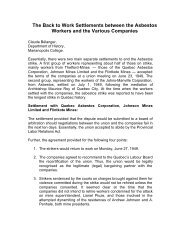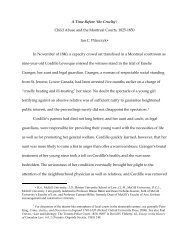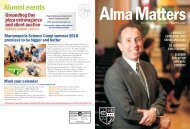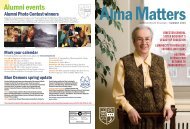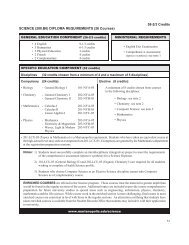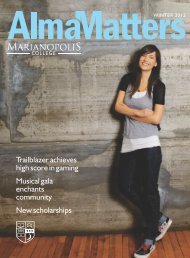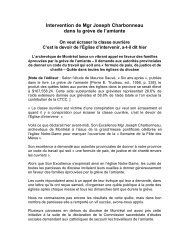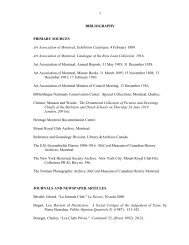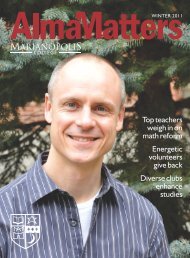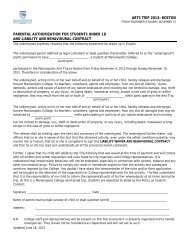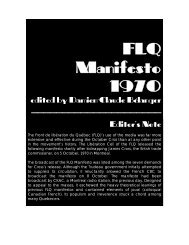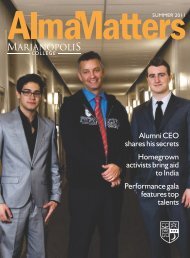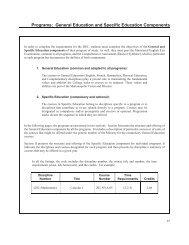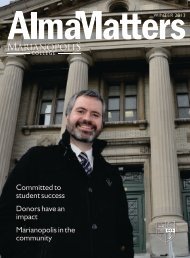Creative Arts, Literature and Languages: EnglishDetective Fiction603-LCK-MS (3-0-3) 2 creditsThis course explores the development,conventions and features of the formaldetective story. Through the examinationof works representative of keyperiods in the history of the genre,students explore the relationshipbetween a story’s particular use of theformal characteristics and the beliefsand anxieties of the historical periodin which it was written.Civilization in Crisis603-LEB-MS (3-0-3) 2 creditsThis course focuses on the theme ofcivilization in crisis. We begin byexamining Margaret Atwood’s TheHandmaid’s Tale, focussing on theways in which her representation of afuturistic civilization in crisis reflectssocial anxieties particular to theperiod in which her novel waswritten. Then, through our analysis ofChinua Achebe’s Things Fall Apart,we re-examine our assumptions aboutcivilization and the often ironiccauses of its decline.Revenge603-LEC-MS (3-0-3) 2 creditsThis course explores the literarytheme of “revenge,” as found in avariety of works from differenthistorical periods and cultures. Byexamining stories and passages fromvarious mythologies, as well plays,novels, short stories and movies,we explore our desire to “get even,”the ways in which this theme isconnected to the values of the societyand culture in which the works werecreated, the forms revenge may take,and the often-tragic consequencesthat result from vengeful acts.80Poetry603-LEH-MS (3-0-3) 2 creditsIn this course, students will examinea variety of poetic forms and styles,covering a broad historical range,with emphasis on more recentsamples from the 20th and 21stcenturies. Topics to be coveredinclude: an overview of poeticperformance (from bardic recitationto the contemporary poetry slam);analyses of sound, rhythm and meter;a brief review of popular poetic forms(including ballads, sonnets, epigrams,and haikus); an exploration of controversiesregarding the interpretationof poetry; and, examinations of poets’prose commentaries on their influences,practices, and philosophies.The Western603-LEJ-MS (3-0-3) 2 creditsThe Western remains a popular andinfluential genre constituted by avariety of motifs (e.g. cowboys,Native Americans, saloons, six gunsand sheriffs), settings (e.g. wild openspaces and the American West circa1870), plots (e.g. a train/stagecoachversus thieves and a man seekingrevenge) and subjects (e.g. freedom,violence, otherness andpersonal/national regeneration).Through short stories, novels andfilm, this course will explore how theformulas of the early Western haveparadoxically enabled the genre’smore recent engagement withrevisionist historicism and postmodernism.Contemporary American Drama603-LEL-MS (3-0-3) 2 creditsThe tragicomedy of contemporaryAmerican life is thematicallyexplored through ContemporaryDrama’s early roots in the traditionsof the Theatre of the Absurd,postmodernism, and existentialism,to its more political, social, andexperimental aspirations in the Off-Off Broadway and performance artmovements. Students also explore theimplications of race, class, identity,gender, and AIDS in the variousplays from this period.Folk and Fairy Tales603-LFA-MS (3-0-3) 2 creditsThis course explores the conventionsand characteristics of folk and fairytales. Students employ a variety ofcritical approaches (e.g. Freudian,Jungian, Feminist, Marxist) toanalyze tales. The course focuses firston fairy tales in early written forms,then on versions of these tales byauthors such as Charles Perrault,Jacob and Wilhelm Grimm, andJoseph Jacobs, and finally onreinterpretations by 20th and 21stcentury authors and filmmakers. Thecourse also includes study of originalliterary tales by authors such as HansChristian Andersen and Oscar Wilde.Life Writing603-LFB-MS (3-0-3) 2 creditsThis is a writing course whichfocuses on non-fiction writing basedon personal experience. Through anexamination of critical theory, writingtechniques and participation in thewriting process, students explore howwe shape and remake our reality withwords. Readings include five genresof life writing: diary and journal,letters, autobiography, biography,and the personal essay.Unheard Voices603-LFC-MS (3-0-3) 2 creditsThis course introduces a number oftexts (short stories, essays, poems,and two novels) in which the narratoror speaker’s point of view profoundly
Creative Arts, Literature and Languages: Englishaffects the reader’s response to theliterary work. In these texts, authorsuse the literary techniques ofcharacter, point of view and voice toenhance and develop major themessuch as perception, misunderstanding,alienation, and deceit.Cinema and the Novel603-LFD-MS (3-0-3) 2 creditsThis course explores the challengesinherent in adapting novels in general,and the novels considered in class, inparticular, for the feature film. Thehistory of the relationship betweenthe novel and the feature film isconsidered, as are the similaritiesand differences of these two media.Bare Survival603-LFG-MS (3-0-3) 2 creditsStudents will explore the theme of“bare survival” in Canadian literature,or what one critic calls literature “notabout those who made it, but thosewho made it back.” We will analyzeperceived differences betweenCanadian, American and Britishculture before identifying ways inwhich Canadian literature differsfrom its cultural influences. Wewill then examine bare survival subthemessuch as nature as enemy,animal as victim, the “noble savage”and other solitudes. We will alsoapply renowned critical approachesto selected texts.Journalism603-LFH-MS (3-0-3) 2 creditsThis course is an introduction to theworld of the journalist and its specialrequirements. Part of understandingthis world includes an intelligentevaluation of journalistic practicesand their effects upon society. Thecontent ranges from the straight newsstory formula and editorial writing tofeature writing and interviewingstrategies. Montreal journalists willbe invited to the class to share theirexperiences as sports writers,editorialists, and photo-journalists.Creative Non-Fiction603-LFJ-MS (3-0-3) 2 creditsThis course is designed for studentsto develop their skills in writingcreative non-fiction. Focus is placedon exercises that encourage thecreative process, beginning withshort, directed assignments andculminating in longer, original pieces.In addition, students are introduced tothe use of specific literary techniquesand devices that can be incorporatedinto their own work. Through theprocess of group writing seminars,feedback from the instructor,revision, and class critique, studentslearn to edit their own work. All ofthese elements help students find anddevelop their own literary voice.Creative Writing603-LFJ-MS (3-0-3) 2 creditsThis course is designed for universityboundcollege students, allowingthem to develop their skills throughwriting short fiction. Through a combinationof writing exercises and aconsideration of texts, students willbe introduced to the use and effects ofspecific literary techniques, including:point of view, tense, significant detail,style, etc. Through writing seminars,feedback and revision, students willbe expected to develop an editorial“ear.” Beginning with exercises thataccess student’s creative process, theshort, directed assignments focus onspecific skills and conclude with acompleted short story.Screenwriting603-LFJ-MS (3-0-3) 2 creditsThis course is an introduction to thescreenwriting process, from generatingideas, to the components of filmnarrative, to the elements of visualcomposition. After studying guidesto story structure – the three-act plotstructure and Joseph Campbell’s TheHero with a Thousand Faces – theseparadigms are applied to the students’own short screenplays throughexercises in story structure, genre,characterization and dialogue. Inlearning the nine stages of screenplaydevelopment, from Character reviewthrough to the Final draft the studentsbecome familiar with Final Draft,screenwriting software and standardscreenplay formatting.Writing(s) about Food603-LFB-MS (3-0-3) 2 creditsThis course examines the culturalrelevance of food and itsconsumption. We begin by readingnon-fiction texts from a variety offields—including psychology,anthropology, history and naturalscience—in order to explore culturaland social differences in thepreparation and consumption of food.We then analyse films, novels, shortstories, poems, and narrative essaysthat use food as both and image andsymbol to establish mood, illuminatecharacter, make social commentaries,and examine the question of what itmeans to be human.Shakespeare’s Communities603-LFL-MS (3-0-3) 2 creditsCommunity argued James Baldwin,‘simply means our endless connectionwith, and responsibility for, eachother.’ This course develops students’ability to apply a critical approachto the theme of community withinseveral of Shakespeare’s plays. Theplays all tend to affirm that, forbetter or for worse, it is throughsocial engagement with others thatindividual identities are most fullyand meaningfully asserted.81
- Page 2 and 3:
VISIONMarianopolis College, drawing
- Page 4 and 5:
GENERAL INFORMATION: Introduction t
- Page 6 and 7:
AdmissionsOUT-OF-PROVINCEAPPLICANTS
- Page 8 and 9:
Financial Information• Birks Fami
- Page 10 and 11:
Financial InformationConfirmation F
- Page 12 and 13:
Academic Information• Failure (EC
- Page 14 and 15:
Academic InformationThose who are a
- Page 16 and 17:
Rules and Regulationsand whether su
- Page 18 and 19:
EDUCATIONAL RESOURCES & SERVICESAss
- Page 20 and 21:
Educational Resources and ServicesS
- Page 22 and 23:
CHOOSING A PROGRAMDiploma Programs
- Page 24 and 25:
CertificatesSpecial InterestCertifi
- Page 26 and 27:
Programs: General Education and Spe
- Page 28 and 29:
General EducationGENERAL EDUCATION
- Page 30 and 31:
General Education: Englishidentifyi
- Page 32 and 33: General Education: Englishas the fi
- Page 34 and 35: General Education: Englishintended
- Page 36 and 37: General Education: Frenchand curren
- Page 38 and 39: General Education: Frenchce cours t
- Page 40 and 41: General Education: HumanitiesHumani
- Page 42 and 43: General Education: Humanitiesunders
- Page 44 and 45: General Education: Humanitiespracti
- Page 46 and 47: General Education: Humanitiespracti
- Page 48 and 49: General Education: Physical Educati
- Page 50 and 51: General Education: ComplementaryCom
- Page 52 and 53: General Education: ComplementaryMod
- Page 54 and 55: SECTSpecificEducation Component- Sc
- Page 56 and 57: Science: Biology - ChemistryBiology
- Page 58 and 59: Science: Mathematics - PhysicsR and
- Page 60 and 61: 56-2/3 to 58 CreditsSOCIAL SCIENCE
- Page 62 and 63: Social Science: Profiles - General
- Page 64 and 65: Social Science: Psychology ProfileE
- Page 66 and 67: Social Science: Law, Society and Ju
- Page 68 and 69: Social Science: Honours CommerceHon
- Page 70 and 71: Social Science: Anthropology - Biol
- Page 72 and 73: Social Science: History - Mathemati
- Page 74 and 75: Social Science: Political Sciencedi
- Page 76 and 77: Social Science: Religion - Sociolog
- Page 78 and 79: 54-2/3 CreditsCREATIVE ARTS, LITERA
- Page 80 and 81: Creative Arts, Literature and Langu
- Page 84 and 85: Creative Arts, Literature and Langu
- Page 86 and 87: Creative Arts, Literature and Langu
- Page 88 and 89: Creative Arts, Literature and Langu
- Page 90 and 91: Creative Arts, Literature and Langu
- Page 92 and 93: 58-2/3 CreditsMUSIC (501.A0) DIPLOM
- Page 94 and 95: MusicEar Training and Theory IV551-
- Page 96 and 97: 59-1/3 CreditsARTS AND SCIENCES (70
- Page 98 and 99: Arts and Sciences: English - Humani
- Page 100 and 101: Arts and Sciences: Art History - Ar
- Page 102 and 103: Arts and Sciences: Mathematics - Mu
- Page 104 and 105: Arts and Sciences: Multidisciplinar
- Page 106 and 107: 56-2/3 to 58 CreditsLIBERAL ARTS (7
- Page 108 and 109: Liberal Artsof evolution; the first
- Page 110 and 111: Liberal ArtsOptionalIn addition to
- Page 112 and 113: Teaching FacultyFLEISCHER, George T
- Page 114 and 115: Teaching FacultyTRILLER, Bernice Sh
- Page 116: INDEX II: Programs and CoursesGener



